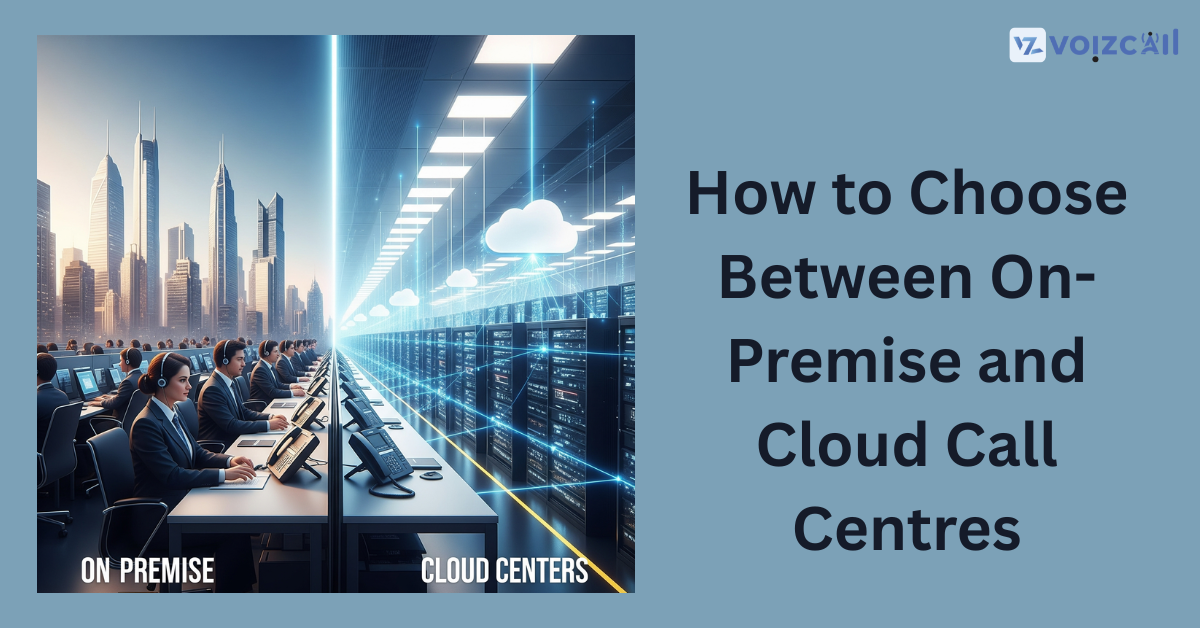


19/Jun/2025
Once your business is expanding and the number of customer calls is rising you need to consider a serious thought about your call center environment. Considering that it is one of the most common questions a business is asked, the question is:
It is better to opt out of on-premises call center or adopt a cloud call center?
Each of the two has its merits and restrictions. Here is a blog where we will guide you to have an idea of an on-premise vs cloud call center, simple words, real-life examples and business insights.
Difference between On-Premise and Cloud Call Centres What Is the Difference Between On-Premise and Cloud Call Centres?
On-Premise Call Centre
An on-premise call center is hosted at your physical business location. You own the hardware, install the software, and your in-house IT team handles everything.
Advantages of On-Premise Call Centres:
Complete control over infrastructure and data
Better suited for businesses with strict compliance regulations
Can work independently of internet reliability
Disadvantages:
Call / Email for Sales Inquiry Today
High upfront investment
Ongoing maintenance and upgrade costs
Limited remote access capabilities
Cloud-Based Call Centre
A cloud call center (also known as a cloud contact center) is hosted on the internet. Your agents and supervisors log in from anywhere, and the provider handles maintenance, updates, and security.
Advantages of Cloud Call Centres:
Low initial setup costs
Expands and contracts easily
Perfect solution when working with backoffice or mixed teams
Automated software deliveries
Quick implementation (usually in a day, or even two)
Disadvantages:
Internet-dependent
Customization options may be limited
Data security depends on vendor’s policies
Real-Life Example: Small Business Switch to Cloud
As an example, a small e-commerce company based in Mumbai would be logging into an on-premise call center. With the growth of the team and the transition to the remote mode, the infrastructure on the site became costly and complex to manage. The change to a cloud call center application took the current team collaboration to the next level, cut down costs and provided them with the freedom to support their customers wherever they were.
Some Things You Must Know Before You Make Your Decision
1. Investment and Budget
A cloud call center is also a good option specifically when you tend to work within the confines of a limited budget and a pay-as-you go pricing option.
On-premise might suit you in case you are willing to make a massive one-time purchase and are in need of complete control.
2. Remote Work and Team Flexibility
Cloud systems are perfect for remote customer service teams.
On-premise setups are better if your team works from a central office.
On-premise systems are preferred when your company uses a Central office as a work place.
3. Needs Security, and Compliance
On-premise call centers provide more control on critical data and are suited to get used in the finance, healthcare, and legal sector.
Strength of security and compliance tools (ISO, HIPAA, GDPR) are also available by the leading cloud contact center providers.
4. Scalability, and Growth
Cloud systems will also enable you to add or take away users within a short time- good with the seasonal businesses.
On premise system needs hardware updates that are time consuming and expensive.
On-Premise vs Cloud Call Centre: Side-by-Side Comparison
|
Feature |
On-Premise Call Centre |
Cloud Call Centre |
|
Setup Time |
Weeks to Months |
Hours to Days |
|
Initial Investment |
High |
Low (subscription-based) |
|
Maintenance |
In-house IT team |
Managed by vendor |
|
Remote Work Support |
Limited |
Full access from anywhere |
|
Software Updates |
Manual |
Automatic |
|
Scalability |
Slower, hardware dependent |
Instant and flexible |
Final Thoughts: Which Call Centre Solution is Best for You?
Choosing between a cloud-based call center and an on-premise call center depends on your company’s:
Budget
Growth plans
IT capabilities
Need for mobility and remote access
Security and compliance requirements
For most modern businesses, especially small and medium-sized ones, the cloud call center model offers better value, faster setup, and more flexibility.
However, if you're in a highly regulated industry or prefer full control over your infrastructure, on-premise call center solutions still have their place.
Consider a Hybrid Call Centre
Hybrid call center is a solution that brings the advantages of both universes as there is a possibility to arrange some processes to work on-premise, and some of them to work in the cloud. This is an awesome strategy when it comes to commercial entities who are changing slowly or are in other parts of the world.